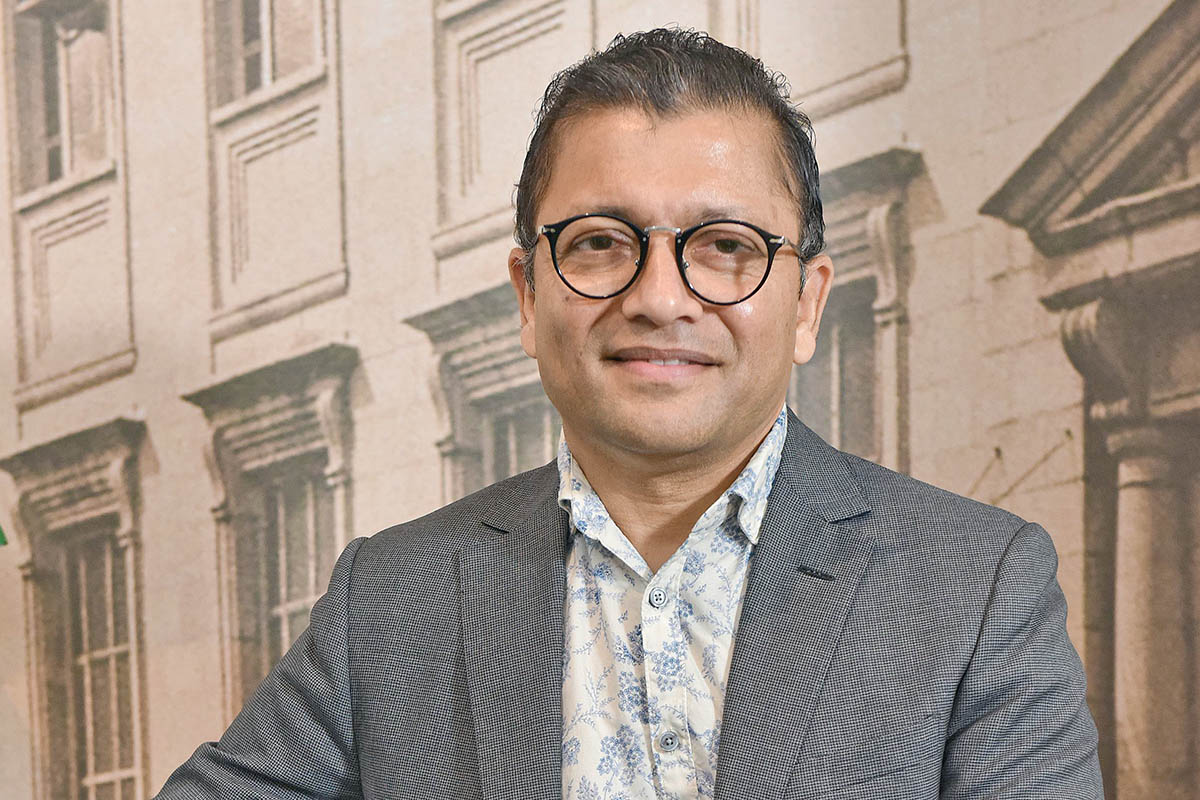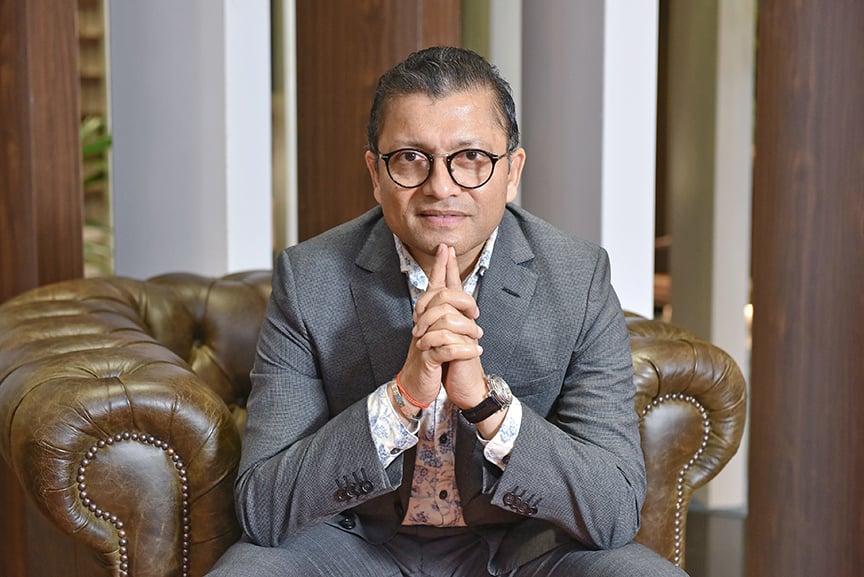After 10 years as Managing Director of Barclays Bank (Mauritius) Limited, Ravin Dajee faced the greatest professional challenge of his life. In early 2016, Barclays PLC announced that it would reduce its shareholding in Barclays Africa Group.

The group embarked on a two-year transition journey, leading to the rebranding of all entities from Barclays to Absa in February 2020 – one of the continent’s biggest rebranding exercises. It fell to Ravin to keep morale high among the bank’s customers and employees in Mauritius throughout that significant period.
“As Managing Director of Absa Mauritius, I had to carefully manage the uncertainty and anxiety that was felt across the bank about the future. Failing to anticipate and address these organisational emotions could have led to a drop in business performance and a loss of critical talent,” Ravin says.
“It was also very important for me that we share with our customers the future road map, and reassure them that they would continue receiving the same level of service as they did before, with improved support. We also ensured that customers understood the advantages of banking with Absa, a key player in Africa with a strong presence on the continent.
“We are now, more than ever, a partner of choice for large corporates expanding into Africa and beyond, and we have bespoke solutions for global and Africa-based large corporates expanding in the region. We also have a solid track record and expertise in servicing global corporates and helping channel investments from Asia, Europe and the US towards the continent,” Ravin adds.
Last year, Absa partnered with Société Générale in corporate and investment banking to broaden both companies’ reach and boost client coverage across the continent. Ravin was entrusted by the Absa Group with the responsibility for leading and coordinating the strategic and operational aspects of this commercial agreement.

Moreover, this year, Absa Group concluded an agreement with the Multilateral Investment Guarantee Agency (MIGA), a member of the World Bank Group, to help Absa expand financing across seven countries in sub-Saharan Africa.
Ravin says the agreement shows Absa Group’s ongoing commitment as a socially responsible lender, which aligns with the Group’s commitment under the UN Principles for Responsible Banking, to which Absa signed up in 2019.
Reflecting on all of the transformations the bank has undergone since 2016, Ravin adds, “With the support of the management team, I made sure that our people understood why these changes were happening. This was undoubtedly one of the largest and boldest rebranding projects in Africa, translating a deep-rooted resolve to launch a proudly African group after a century of European ownership. We can be proud of the road we have travelled.”
Opportunity for growth
That Ravin would be able to lead Absa Bank (Mauritius) through its most precarious period should come as no surprise. He has been a stabilising presence at the bank ever since he joined in 2006.
After six months as Corporate Banking director of Barclays Mauritius, he was promoted to his current position following the resignation of the previous Managing Director. “This was the third resignation in 18 months – not a positive signal – but I wanted to take on the challenge and accepted the job,” Ravin says.

The journey has had its share of challenges. Previous leadership roles in domestic entities made his appointment in an international organisation a momentous shift, with events being exacerbated by the 2008 global financial crisis and the ensuing Eurozone crisis.
“Mauritius was particularly badly hit, given its vulnerability as an open economy and a net exporter to the Eurozone. They had a significant impact on our economy due to the high dependence on our exports such as tourism, textiles and sugar in markets in Europe, and foreign direct investment,” he says.
Still, he dedicated time to understanding opportunities and trends in the marketplace, the relative strengths of the bank and how the bank could best generate new value.
“A large part of my job involves managing the high standards and expectations of the Group, directors, customers, employees and other stakeholders. I do this while setting a vision and strategy, and aligning the bank around the execution of this strategy to ensure that we meet our objectives and grow in a sustainable manner, while at the same time managing risk and adhering to strict guidelines and regulations,” Ravin explains.
Fundamental to achieving this was upping the ante through continuous and more targeted honing of skills in the bank, including those at the helm, and Ravin led by example. He completed a Postgraduate Diploma in Strategy and Innovation at the University of Oxford and a Senior Executive Leadership Program at Harvard Business School.
In his role as Chair of the Mauritius Bankers Association, he has also led a number of crucial discussions, which have benefited the sector.
We are now, more than ever, a partner of choice for large corporates expanding into Africa and beyond.
“I am proud of what we have managed to accomplish so far with the trust and support of our people, our clients and other key stakeholders. Absa Bank (Mauritius) stands as a leading bank in the Mauritian banking sector. It is well capitalised and highly profitable, with a comprehensive offering and dedicated services catering to individuals, small, medium and large domestic companies, and offshore companies,” Ravin adds.
Developing Mauritius
Although it is one of many entities of a multinational banking group headquartered in Johannesburg, Absa Bank (Mauritius) plays a uniquely important role in the development of its host country. It has been serving customers in the country since 1919 and has successfully promoted the inclusive socio-economic development of Mauritius and its citizens.
“Our growth has been, is, and will continue to be intrinsically linked to Mauritius’ development as a country. Given its strategic position in the region and well-established links with India and Africa, Mauritius has long been an important financial platform within the Africa–Asia trade corridor, through which investors from around the globe can tap into the emerging opportunities in Africa. Authorities and operators are looking externally to stimulate growth with China, India and Africa. Through our activities, we also contribute to positioning Mauritius as a credible international financial centre,” Ravin enthuses.
Ravin believes that the biggest challenge is yet to come with the COVID-19 pandemic, and the uncertainty around the depth and duration of the ensuing economic fallout.
Growth and awards
Over the five-year period ending 31 December 2019, Absa Bank (Mauritius) Limited has achieved:
• An average annual growth of 18.6% in profit before tax, with the industry average 9.5%
• An average annual revenue growth of 10%, with the industry average standing at 8.3%
• An increased return on average equity from 10.5% in 2015 to 16.99% in 2019 (nonnormalised), with industry average returns on equity at 13.2% for the year ended 31 June 2019
Testifying to its strong performance and track record, it has received several prestigious awards and accolades over the years, including:
• Best Foreign Bank in Mauritius by EMEA Finance (2008–2014)
• Winner of the Global Custodian Awards for Securities Services (2008–2010)
• Bank of the Year by The Banker in 2011
• Best Investment Bank in Africa by Euromoney Awards for Excellence in 2014
• Best Bank in Mauritius by Global Finance in 2015
• Best Transaction Bank in Mauritius & Best Cash Management Bank in Mauritius by The Asian Banker in 2018
• Best Treasury & Cash Management Bank in Mauritius by Global Finance in 2019
“Governments, regulators and banks around the globe will be called upon to play a critical role to mitigate the damage to the economy and to people’s lives. Alongside the national measures by the Bank of Mauritius, Absa Bank (Mauritius) has taken further steps to launch relief programs aimed at individuals and corporate customers. At Absa Bank (Mauritius), we are committed to finding solutions to support our customers and the community through this unprecedented crisis. Furthermore, Absa Bank (Mauritius) has a solid capital base and significant liquidity, so we are in a position to contribute meaningfully to the recovery of the Mauritian economy at this most trying of times,” he says.
Personalisation through digitalisation
Ravin believes that in this rapidly evolving digital world, banks need to adapt their operating models to keep up with the pace of change. For instance, he sees the way different business areas within banks operate independently of each other as a failure to capitalise on the knowledge created within each one.
“Banks traditionally operate in silo channels. Although they accumulate enormous amounts of data about their customers, they have been unable to derive specific insight into customer activity, needs and preferences from which to develop and deliver meaningful and powerful personalised customer experiences,” he says.
Slowly, this is changing. Customers are coming to expect personalised banking experiences, and banks are beginning to capitalise on digital technologies and data to make their services as customer-centric as possible.
New trends, from open banking to the rise of fintechs, are disrupting the industry and transforming the way customers engage with their finances. Within this new ecosystem, innovation has become paramount. The COVID-19 pandemic has made customers’ needs for digital banking services more urgent.
Looking ahead, Ravin sees that these unprecedented changes will shift customer demand permanently, and will push banks to review their priorities and accelerate the full digitalisation of their processes, leading to a significant improvement in not only the delivery of services, but also in ensuring bespoke services for customers.
“At Absa Bank (Mauritius), digital is no longer an option. It is a must,” Ravin says. “Innovative banks recognise the importance of delivering the right experience through the right channel at the right time.”
Sometimes, this process places innovation-led operating models at odds with existing legacy systems and banks sometimes struggle to meet strict regulatory guidelines.
“At Absa Bank (Mauritius), we understand that times have changed and, in line with the Group’s aspiration to build a scalable, digitally led organisation, significant efforts are being made to accelerate the transformation journey. For instance, we are opening up legacy systems through microservices and APIs to collaborate with fintechs and startups to create unique customer-focused and technologydriven banking experiences,” Ravin reveals.
“As digitalisation is driving the transformation of the banking industry, understanding customer needs is key to a successful digital strategy. Our digital strategy complements our customer-centred model and our commitment to understanding who our customers are and how we can best serve their banking needs.
“Over the next two years, we will focus on identifying and implementing key strategic digital initiatives that will help us address customer pain points and place us at the forefront of the industry.”
At Absa Bank (Mauritius), Ravin aims to develop digital payments, microloans and savings, digital onboarding and cardless payment solutions, as well as digital self-service kiosks, which he hopes will reduce the cost of transactions and improve the speed of execution, thereby improving the customers’ experience.
“We will also develop innovative offerings to enable our clients to converse with us 24/7, wherever they are, in the most convenient and simple manner,” he says.
Lessons in leadership
A career banker, Ravin has built a raft of experience in different sectors. This diversity has provided him with invaluable lessons, particularly in respect of organisation culture and its effect on performance in both the public and private sectors.
Our growth has been, is, and will continue to be intrinsically linked to the development of Mauritius as a country.
Before Absa Bank (Mauritius), he worked in the international division of the State Bank of Mauritius for 13 years and was appointed Assistant General Manager of South East Asian Bank (Mauritius) for more than a year.
Next, he worked as General Manager for the State Trading Corporation of Mauritius, where he led various key strategic initiatives including the reformation of the mode of importation of strategic products, the revision of the treasury management of the corporation, and the streamlining of the divisional operations of the corporation for improved performance.
For the next two years, he served as General Manager of the Central Electricity Board (CEB), where he was responsible for the re-engineering of business processes of the finance department for greater efficiency, the reconfiguration of the organisational structure of the CEB for enhanced productivity, and the setting up of a dedicated Customer Service department.
Along his journey to become the head of a leading bank in Mauritius, Ravin has also emerged with a genuine devotion to optimism. “The best advice I ever received was to always look for the silver lining – finding the positive in any situation, no matter how challenging it may be – and focus on turning every challenge into an opportunity,” he says.
“The world has changed so much in my lifetime that my team and I firmly believe that it is not where you are from but where you are going that matters. “I believe that this is very much embedded in the collective spirit at Absa Bank (Mauritius).”


